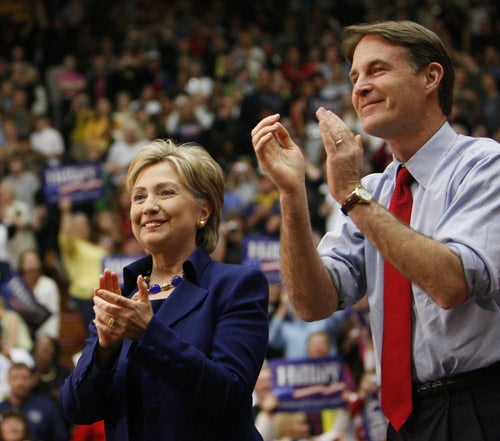Clinton surges ahead in Pennsylvania – but has mountain to climb

Your support helps us to tell the story
From reproductive rights to climate change to Big Tech, The Independent is on the ground when the story is developing. Whether it's investigating the financials of Elon Musk's pro-Trump PAC or producing our latest documentary, 'The A Word', which shines a light on the American women fighting for reproductive rights, we know how important it is to parse out the facts from the messaging.
At such a critical moment in US history, we need reporters on the ground. Your donation allows us to keep sending journalists to speak to both sides of the story.
The Independent is trusted by Americans across the entire political spectrum. And unlike many other quality news outlets, we choose not to lock Americans out of our reporting and analysis with paywalls. We believe quality journalism should be available to everyone, paid for by those who can afford it.
Your support makes all the difference.Hillary Clinton is racing ahead of Barack Obama in the polls for the forthcoming Pennsylvania primary, but she still faces nearly insurmountable odds as she tries to wrest the Democratic nomination away from him.
Mrs Clinton has doubled her lead over her opponent with more than four weeks to go before the Pennsylvania vote, but her hopes of becoming a presidential contender largely depend on her opponent self-destructing between now and the end of the primary season in June.
For the first time in weeks Mrs Clinton has also taken a significant lead in a national Gallup poll, reflecting voters' worries about Mr Obama's close links to his controversial spiritual mentor, the Rev Jeremiah Wright. The infighting among Democrats and the recent negative tone of their campaign has meanwhile benefited the Republicans, with a Reuters/Zogby poll showing John McCain leading Mrs Clinton by three (a statistical tie) and Mr Obama by six points.
Mrs Clinton's strong showing in the Pennsylvania polls gives her a 51 to 35 per cent lead among likely Democratic voters. Last February, the same Franklin poll put the gap at 44 to 37 per cent, less than half what it is today. Yet another poll gave Mrs Clinton a larger 56-30 lead and saw her attracting 27 per cent of the state's important black vote.
The prospect of Mr Obama's campaign imploding seems more remote since Tuesday, when he gave a much-admired speech in Philadelphia about America's racial divisions. He distanced himself from comments made by his mentor, Mr Wright, who has suggested that blacks should damn America for continuing to mistreat them. In 35 minutes, Mr Obama turned the controversy over Mr Wright's inflammatory remarks into an appeal for a more honest debate on race relations.
Liberal commentators, among them Clinton supporters, quickly praised the speech and there was a palpable sense that Mr Obama had brought his campaign back from the brink, even as right-wing commentators denounced his words as insufficient. Mrs Clinton's advisers wisely remained silently on the sidelines of the row, but they still hope that the uproar will rattle the confidence of voters and superdelegates in Mr Obama's campaign.
Superdelegates are the key constituency made up of Democratic Party grandees and elected officials and the Clinton campaign has been discreetly lobbying them to switch sides. Superdelegates are free to decide which candidate to back at the nominating convention and loss of their support could wipe out Mr Obama's delegate advantage.
That contest is finely balanced, with Mr Obama leading his opponent by about 150 delegates. To secure the presidential nomination a candidate needs to win 2,025 delegates.
Mrs Clinton's campaign is also hamstrung by her defeats last month. Senior Democrats say her ability to snatch the nomination from Mr Obama now depends on her winning the overall popular vote when the contests end in June, thereby raising enough questions about his electability to persuade the superdelegates to come to her side. Yesterday, Mr Obama appeared confident that, by that time, he would still hold the lead in the popular vote, as well as delegates from the state contests. He backed a suggestion that the superdelegates then hold a meeting to decide which candidate to back, ensuring the bickering does not go all the way to the August convention. Mr Obama now leads by 700,000 votes out of 26 million cast and 12 million people have a voice in the remaining primaries and caucuses. Mr Obama accepts there is nothing to stop a tenacious Mrs Clinton taking her battle all the way to the floor of the Denver convention on 25 August – in the hope that his campaign will implode along the way – but that will leave little time for the winning candidate to organise and fight the presidential election in November.
For rolling comment on the US election visit: independent.co.uk/campaign08
Join our commenting forum
Join thought-provoking conversations, follow other Independent readers and see their replies
Comments